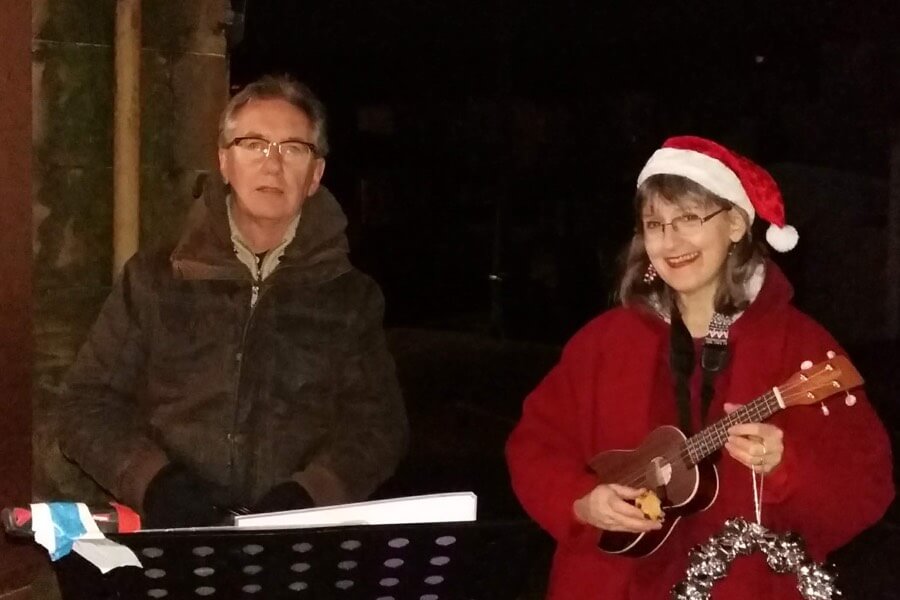
What does Christmas mean to you this year? I can’t write objectively about this, with my ridiculously huge collection of Christmas CDs, DVDs and books, and occasional lectures on Christmas customs. Just call me Christmas Carol. But Covid 2020 stymied my beloved parties, concerts and pantos, deprived us even of a sister’s visit, and broke my heart. This year I hesitate to plunge back into the pandemonium, or even to plan much.
The earliest known roots of our celebration lie in pre-Christian, sun-worshipping, the rule-breaking Roman Feralia and Celtic Solstice celebrations, marked by bonfires and divination. These midwinter rituals to ensure the sun’s return became overlaid with Christian significance and the exquisite story of a child’s birth. But medieval Scotland exulted in Norman-influenced processions, street carnivals, banquets, “daft days” of role-reversal and mischief. In pre-Reformation cathedrals, you’d see the election of Boy Bishops for the season, even dancing in church – imagine!
But then came the 16th c Reformation and its campaign to root out corruption and paganism, which led to cries of “Cancel Christmas!” in Scotland. You could be punished for public partying like a pagan (or Roman Catholic, seen as much the same by then) – yet secret festivities continued in parts of the Highlands and islands. Christmas went underground here, and so we pragmatically transferred many communal midwinter customs to our more secular Hogmanay. That’s why New Year has been much more of a publicly celebrated festival than Christmas in Scotland for some 500 years, and it’s why we do the world’s biggest Street Party. (Or we did…)
In the 18th c, Robert Chambers could still record the ‘guisards’ who’d appear in home-made costumes at Scottish doors to sing, carouse and cause mayhem, hoping for hospitality and pennies, at Christmas, New Year and other annual festival dates.
By the early 19c, Christmas had become associated with charity and “good works”, remembering the poor. Christmas was evolving from public carry-ons to a private, domesticated affair, and not only in these islands. Gradually the Scottish middle classes adopted “English” customs to some degree – including the Germanic Christmas tree, Christmas pudding and crackers – but Christmas was not declared a public holiday here until 1958, so it still signified much less here than in England.
Our ideas of Christmas were greatly shaped by the phenomenal success of Dickens’ A Christmas Carol (1843), and many of us visualise a sumptuous Victorian feast with gigantic turkey and parlour games. Later, through the impact of radio, film and television, we fell under the cultural spell of the American Christmas – always snowy, sweet and sentimental. I can’t resist ‘It’s a Wonderful Life.’
The later 20th c saw even Scots indulge in Christmas works nights out, lunches, parties. And we too were seduced by an exponential rise in commercialisation, as shops developed a longer period of anticipation and Christmas shopping.
The focus now is on family and on conspicuous gift-giving, the ideal Christmas portrayed on glossy magazine covers promising ‘Your Best Christmas Ever’, or in the big-league TV adverts. These can have a hollow ring if you’re (unwillingly) alone, struggling for money, recently bereaved – or even just battling with expectations (external or self-imposed) that you should create the ‘perfect’ Christmas.
And of course, Covid knocked everything sideways for Christmas 2020.
Here at Community Connections, you’ll find we are partial to gatherings and wee celebrations – though we’ll still be taking care, for good reason. Seasonal rituals have a profound value, reconnecting us with the rhythms of nature, revisiting valuable memories, reaffirming our roots, values and relationships, restoring perspective.
Yes, there may be pressures on us. But we can also choose to ignore the adverts and go quietly underground, to ‘keep safe’ and snuggle indoors for a while – or maybe share the season with just one or two folk we trust. The Scottish concept of ‘coorie-in’ is now even glamourised in glossy publications.
Why not strike a graceful balance between coorie-in and conviviality? Some days of hibernation with a hot water bottle and good books, to quiet the mind, by all means – but over the season you could also still join us for Scone Café or Coffee Connections, and even have a Winter Wander with us, to bring roses to your cheeks. Say the word and you can be part of this wee family during the season. We wish you a Braw Christmas, however you spend it.
Carol Stobie, Connections Coordinator

